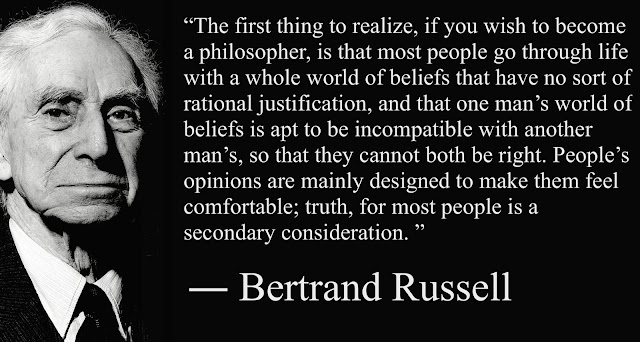I wake up in the middle of the night unable to get back to sleep. It's not because of anxiety, at least I don't think it is. I try to roll over and go right back to sleep. I've found one good technique is that if I can remember even a fragment of whatever it was I was just dreaming about and I concentrate on that, sleep is more likely to come. The worst thing that can happen at 4:30 am is my conscious voice, that pesky little narrator in my head, will start talking to me and telling me something - inevitably always something I already know because that voice is literally me - and I can't go back to sleep while that voice prattles on and on.
One of that voice's favorite topics is this Grand Unifying Theory I think I've come up with. At least the internal voice thinks it's a Grand Unifying Theory at 4:30 am. It's convoluted as hell, a long, shaggy-dog-story of a theory, but that voice wants to keep going over it in a very linear manner. "First, Point A suggests the possibility of Point B, which logically leads to Point C" and so on and so forth to on beyond Point Z and to Points Theta and Gamma and, I don't know, Uma?
To possibly quiet that voice so I can sleep without its didactic lessons, I'm going to try and lay out the GUT in a series of posts here. There's more than I can explain in one single posting - more than any rational person would be willing to read in one post - and much of it has been mentioned at one time or another in these very pages. But I feel compelled to put it all together for posterity.
I know how it sounds, but you can call this my manifesto. I know how it sounds, but I'm writing my manifesto because the voice in my head is telling me to.
Okay, on then, to Point A. One of the early things one learns when studying Buddhism, right after the Four Noble Truths and the Eightfold Path, is the lesson of the Five Aggregates.
The first step of the Eightfold Path is right understanding, and one of the first things to understand is the ephemeral nature of the Ego-Self. The Buddha taught that what we call the "self" or the "ego" or "identity" or even "the soul" is impermanent and dependent upon the existence of other conditions. The Ego-Self, for lack of a better term, is what naturally arises when five specific conditions come together. Since the Ego-Self depends on the accumulation of these five conditions, and since if even one of these conditions is absent the Ego-Self ceases to exist, the Ego-Self can be thought of as an aggregate of these five conditions. Therefore, the Buddha called these conditions the Five Aggregates.
What are they? The first is Form - there must be some discernible physical entity present for everything else to come together. The most common Form is the mind, or the physical brain, but other Forms are possible - a computer chip or some alternate biological form could suffice ("the mind of trees and grasses"), as long as the other four Aggregates are present. The "Hive Mind" of bees and ants is a good example of a Form other than the grey matter of a brain.
The second aggregate is Feeling. For the Ego-Self to emerge, the Form has to be sensate - it has to receive sensory input from other phenomena around it. Seeing, hearing, smelling, tasting, touching, and even thinking are all types of Feeling, and any one of them, if not all, are necessary for the arising of the Ego-Self.
So far, then, a motion-activated spotlight would qualify. as a vehicle for an Ego-Self. It has Form - the physical spotlight itself - and it has Feeling - the ability to perceive motion around it. But an Ego-Self does not arise because it lacks the third aggregate - Thought. The spotlight "sees" motion and switches on, but it doesn't think about it. It doesn't decide whether to light up or not. It's not sentient, it doesn't think, so an Ego-Self does not arise. You can relax - your security devices aren't plotting to kill you.
For just a moment, we'll skip over the fourth aggregate, Impulse, to talk about the Fifth. I promise we'll come back to Impulse - it's the whole point of this post. But the Fifth Aggregate is Consciousness. The Form has to be aware that it's sensing phenomena and that it is thinking. Like that motion-activated spotlight, Alexa, the AI in a so-called "smart speaker," has form, perceives sounds and light, but it can be argued that it also "thinks" about it's responses. A high-end one can even "learn" based on its prior performance. But without consciousness, without it being self-aware that its learning and thinking, no Ego-Self arises inside of that gizmo.
And why isn't it conscious? The Buddha would maintain it isn't conscious because it lacks the Fourth Aggregate, Impulse, which gives rise to consciousness. That was the one that always interested me the most, because I could never really understand it, and based on numerous Buddhist books I've read that failed to adequately explain it, I suspect that many others don't understand it either.
The first problem is that the term "Impulse" is a poor translation of the Sanskrit word for the Fourth Aggregate, samskara. Samskara sounds like the familiar term samsara, the cycle of successive lives and rebirths, but it's a very different thing. The Shambala Dictionary of Buddhism and Zen defines samskara as, literally, "impression" or "consequence," although it's usually translated as "impulse," "formations," or even "mental formational forces," whatever they are. The noted Chinese translator Red Pine (Bill Porter) translates it as "memory."
Now what is it, I wondered, that they are talking about if it can be variably translated as "impulse," "mental formation" and even "memory"? Those sound like some very different things. And if the only difference between my ego-self and an Alexa AI is the presence of samskara, ought I not to understand what it is?
My research into samskara, both academic (i.e., book reading) and contemplative (i.e., meditation), has lasted for several years. It's still ongoing, and every couple of months or so I think I have an "Aha!" moment and go around telling everyone what I think it means, and posting messages about if here on this blog, but then a few months later I come to some other conclusion that negates the previous one. After a few cycles of that, you begin to doubt any understanding you thought you had (which the Buddha would point out is the necessary first step to understanding anything, especially self nature).
My current understanding, the one that's stayed with me for at least five years now, came almost by accident during some totally unrelated reading on psychology and neurology. I was reading about so-called mirror neurons, neurons in the brains of some primates, including humans, that light up when they see, rather that experience, a phenomenon, and react exactly the same way they would if they had directly experienced the phenomenon.
Here's an example - I was at a state office building several years ago reviewing some archived files for a project. As I was leafing through a large folder of letters and correspondence, I suddenly got a paper cut on a fingertip. It wasn't painful so much as startling, and I involuntarily twitched. Just as I did, an office worker who happened to be walking by at that exact moment saw me twitch, instantly perceived why I had twitched, and involuntarily, she twitched, too. "I felt that," she said, a total stranger to me.
That was her mirror neurons firing. She saw my regular neurons fire in response to a painful sensation, and her mirror neurons fired up in the same way, as if she had experienced the sensation herself. There's nothing supernatural about it, no "spooky action from a distance," it's just the way we're wired (I accidentally wrote that at first as "that's just the way we're weird," and actually, that works too). The reaction of mirror neurons is probably why horror movies are so frightening. It's probably why pornography works too, but that's a whole other conversation.
I found this interesting, but never even considered associating it with samskara. But then I read another article about an Indian neuroscientist, Dr. V.S. Ramachandran. Dr. Ramachandran had observed the actions of mirror neurons in monkeys, and hypothesized that the mirror neurons may have been what lead to the creation of self-awareness as experienced by higher primates.
Imagine a monkey sitting in a tree observing another monkey running across the jungle floor to gather some fallen fruit. Suddenly, a leopard or other predator jumps out from nowhere and snatches the monkey on the ground. All the other monkeys in the trees shriek in horror as their mirror neurons fire. The incident has the monkeys' full attention, and their neurons are firing and adrenaline is coursing through their veins. They could "feel" the other monkey's ambush, just like the office worker could "feel" my paper cut. As once, they feel like they are that interconnected with monkey on the ground and at the same time realize that they are separate and safely up a tree. But it could just as easily have been them on the ground.
This, Dr. Ramachandran hypothesizes, gives rise to the creation of mental models that can predict the outcome of their actions and their own safety based on what they see happen to other monkeys. The other monkeys are surrogates, if you will, for themselves, and if the surrogates are "others," than they must be separate "selves." This is the origin, Dr. Ramachandran proposes, of the concept of a "self" and an "other," and therefore the evolutionary origin of the Ego-Self. And it all happened because of mirror neurons.
That was an epiphany for me. The Buddha taught that samskara gave rise to consciousness, and Dr. Ramachandran suggested that it was mental models gave rise to the Ego-Self. What if they were both right? In that case, samskara would equal "mental models," and suddenly the translations "formations," and even "mental formational forces" began to make sense.
In order for an Ego-Self to arise, one needs Form, Feeling, Though, and Consciousness, as well as the concept, the mental model, that the Form is one thing and the rest of the universe another. We are an Ego-Self because we've created the hypothesis that we are a self and everything else is other. We, the Form, feel this, think that, and are consciously aware that we are feeling this and thinking that, and that awareness results in a hypothesis that we are a self separate from the things we feel and think about. Thus is the origin of the Ego-Self arises. Or so I understand the Buddha to have taught.
This was just the start of my research into samskara. It wasn't the end of my quest, just the identification of the subject of my quest. Somehow, samskara seemed to hold the key to so much more, and I've followed it down several rabbit holes, some productive, some not so much. I'll talk about it more and explain some of those other thoughts and observations, but I think this post has gone on long enough for now. I'll pick it up again later in another, future post.
tl;dr: samskara are mental formations, or mental models, the most significant of which is that self and others are separate things.








































